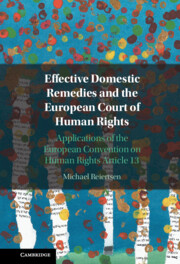 Effective Domestic Remedies and the European Court of Human Rights
Effective Domestic Remedies and the European Court of Human Rights Published online by Cambridge University Press: 11 August 2022
Chapter 13 summarizes important findings and offer two recommendations to the Court with regard to how Article 13 could be developed: (1) The Court should engage in more and stricter procedural review by controlling and setting out requirements with regard to how domestic remedial authorities must consider whether the Convention has been violated. To this end, the Court should make more use of Article 13. The counterpart of the increased procedural review should be less substantive review. (2) The Court should engage in more principled and abstract reasoning concerning Article 13, in particular the required form of redress. More principled and abstract reasoning stands in contrast to concreteness. It provides guidance, but allows for flexible implementation in different domestic legal systems.
To save this book to your Kindle, first ensure no-reply@cambridge.org is added to your Approved Personal Document E-mail List under your Personal Document Settings on the Manage Your Content and Devices page of your Amazon account. Then enter the ‘name’ part of your Kindle email address below. Find out more about saving to your Kindle.
Note you can select to save to either the @free.kindle.com or @kindle.com variations. ‘@free.kindle.com’ emails are free but can only be saved to your device when it is connected to wi-fi. ‘@kindle.com’ emails can be delivered even when you are not connected to wi-fi, but note that service fees apply.
Find out more about the Kindle Personal Document Service.
To save content items to your account, please confirm that you agree to abide by our usage policies. If this is the first time you use this feature, you will be asked to authorise Cambridge Core to connect with your account. Find out more about saving content to Dropbox.
To save content items to your account, please confirm that you agree to abide by our usage policies. If this is the first time you use this feature, you will be asked to authorise Cambridge Core to connect with your account. Find out more about saving content to Google Drive.